‘Heart and honesty’: Anu’s stunning, stirring bilingual fusion
On her ninth album, titled Waku, Christine Anu repositions herself as one of Australia’s most beautiful and poignant voices while celebrating her proud Torres Strait Islander heritage.

Album reviews for week of August 2 2024:
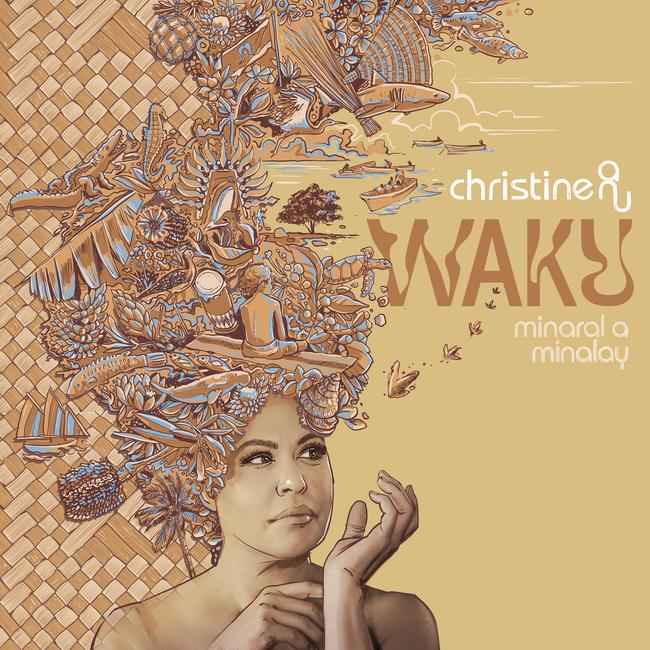
ALTERNATIVE POP
Waku – Minaral A Minalay
Christine Anu
ABC Music
On her first album of original music in two decades, Christine Anu repositions herself as one of Australia’s most beautiful and poignant voices. The record, titled Waku – Minaral A Minalay, speaks to Anu’s proud Torres Strait Islander heritage; the result is a stunning fusion of soundscapes and language that is executed with heart and honesty. Translated to English, the album title is Mat, Colours, Patterns. And like the intricate tapestries of a family or cultural history, Anu’s latest collection of music comes flecked with shades of rich musical tone, instrumentation and storytelling. By again teaming up with acclaimed musician and producer David Bridie, who also produced her 1995 debut album Stylin’ Up, Anu carefully and patiently created this album across different sessions in Cairns, Papua New Guinea, New Zealand and the Torres Strait. As such, the soundscapes heard throughout (Gul Melawal, The Coming Monsoon) weave together traditional and contemporary sounds in a natural way. Strings and percussion complement each other perfectly on the title track, whose sounds were captured during a trip to Thursday Island. The feature of the warup (drums), as well as traditional urub (shakers) that buoy Anu’s vocals, heighten the drama of songs such as My Popu Nadhi Anu and Laga Saibai, resulting in a highly immersive listen.
In creating this album, Anu embarked on a journey of rediscovery, retracing the steps her grandfather made with his young family post-World War II, migrating from Saibai Island to Mutee Head. For Anu, this process served not only as a way to collect sounds and references for this album but also to add a new thread to her family’s history. It is what makes this album such an important addition to her already celebrated catalogue. Hearing Anu sing in language (Dhibagaw Gabu, Kole Kolele) is an absolute pleasure at every turn; the music is inviting to any listener seeking to experience brief vignettes and insight to the story of her family and her culture. A strong spirit is at the core of Waku, many of whose songs are based on compositions penned by her grandfather, Nadi, a hobbyist musician and diving boat captain. There are many moments during this record that can bring a listener to tears, simply through the use of stunning vocal harmonies (Adhibuya, Nur Nur) or by Anu’s classic style of storytelling, which is intimate and open (Aukum of Saibai). This album feels as if it has been part of Anu’s artistic journey for a long time: the DNA of this music has been with Anu her whole life, and only now do we get to hear it in a fully realised, completed version. And perhaps that also can be said of this chapter in Anu’s creative arc; ultimately, it’s a beautiful touchstone moment.
Sosefina Fuamoli
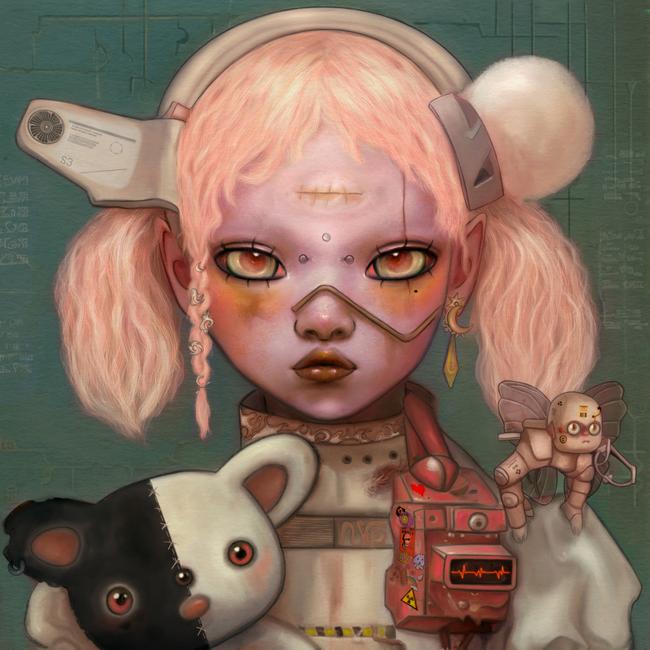
METALCORE/POP
Post Human: NeX Gen
Bring Me The Horizon
Sony Music
From deathcore punching bags to the metalcore kids that could, to pop-metal try-hards, to an Ed Sheeran feature, Bring Me The Horizon’s career has been chaotic and dumbfounding, and things have again taken a head-spinning turn. With its seventh album, the band suddenly released the most important guitar record of the year. Now firmly established as an arena-sized live act, the Sheffield quartet fuses sounds to excite TikTokers and moshers alike to masterful effect here. Track four lurches violently between hyper-pop and crushing deathcore; Lost channels mid-2000s Paramore and djent in a short space, and N/A sounds like Olivia Rodrigo doing her best metalcore ballad. On paper, an Aurora feature on a doom-metal stomper, or a Lil Uzi Vert verse over a manic industrial-tinged metalcore stadium anthem shouldn’t work. Still, both appear here as album highlights on the exciting Limousine and Amen, respectively. As with its seminal 2013 effort Sempiternal, expect the shadow of BMTH’s Next Gen series to loom over heavy music for the next decade. A bit of trimming on side B would have made this an all-time classic.
Alasdair Belling

ELECTRIC FOLK
Lives Outgrown
Beth Gibbons
Domino
What part does failure play in great music? You could argue it is the ingredient beneath those artists we most appreciate. Everywhere on Lives Outgrown lays the fatal aspiration to create a masterpiece. Now 59, Gibbons made her mark as the singer for Portishead, who helped define a nocturnal 1990s Bristol sound heightened with electronic orchestrations and starry dub production. Live, Gibbons could be a different proposition; as much Janis Joplin as ice-cool chanteuse. In collaboration with James Ford, Lives Outgrown is her first album of original songs in 22 years. Electric folk influences from the early 1970s are obvious, along with arrangements that nod to the Polish composer Gorecki’s “sacred minimalism”. The electro-acoustic musicianship is extraordinary; the production intimate, spooky. Gibbons sings of lives and loves lost, an Eden she can’t get to, with Anne Briggs and Sandy Denny her damaged-feminism vocal polestars. As the title suggests, reincarnation is a theme, the music pagan yet futuristic. Somewhere between, Gibbons is still on her way.
Mark Mordue
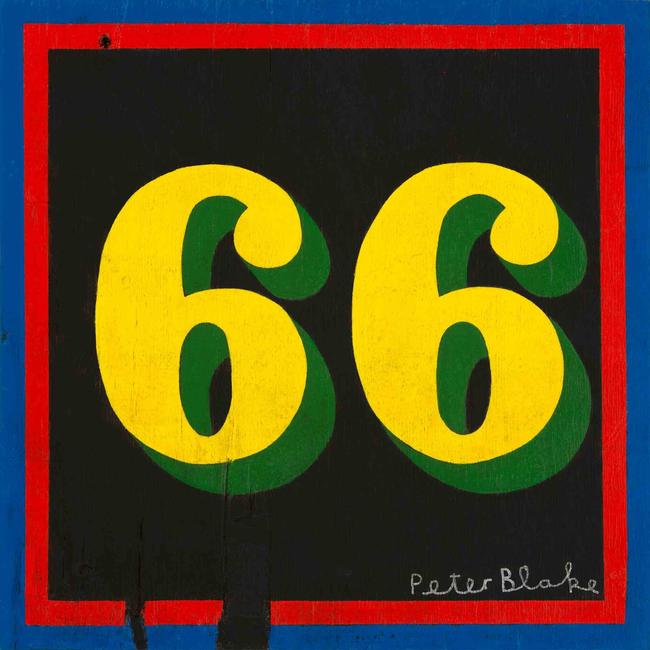
SOUL/LOUNGE
66
Paul Weller
Universal
Marking his 66th birthday in May, Paul Weller’s 17th solo album was three years in the making with a kitchen-sink cast of contributors – 30-plus musicians and four producers, including Weller – to match. The former Jam/Style Council frontman also enlisted no fewer than 10 lyricists, including Suggs (Madness), Bobby Gillespie (Primal Scream) and Noel Gallagher (Oasis). All of which suggests Weller has hit a creative wall in late middle age. Following up 2021’s Fat Pop, 66 is even fatter, 12 tracks of ersatz soul replete with strings, brass, woodwinds, vibraphones and enough keyboards (piano, organ, mellotron, synths, harpsichord, etc) to stock a music shop. The album’s singular highlight, ironically titled Nothing, is a lounge classic in waiting with its Bacharach-arama flugelhorns, Moog bass and ‘70s-era squidgy synths, over which Weller soulfully croons, “It was only by having nothing / We were able to realise we needed nothing else”. Gallagher co-write Jumble Queen is the album’s token rocker wherein the horns are put to best use, though the aptly named Burn Out — a shameless Pink Floyd pastiche replete with echo-drenched sax solo, lilting drums, wispy slide guitar and orchestral flourishes — underscores the bloated wastage of the entire project.
Phil Stafford
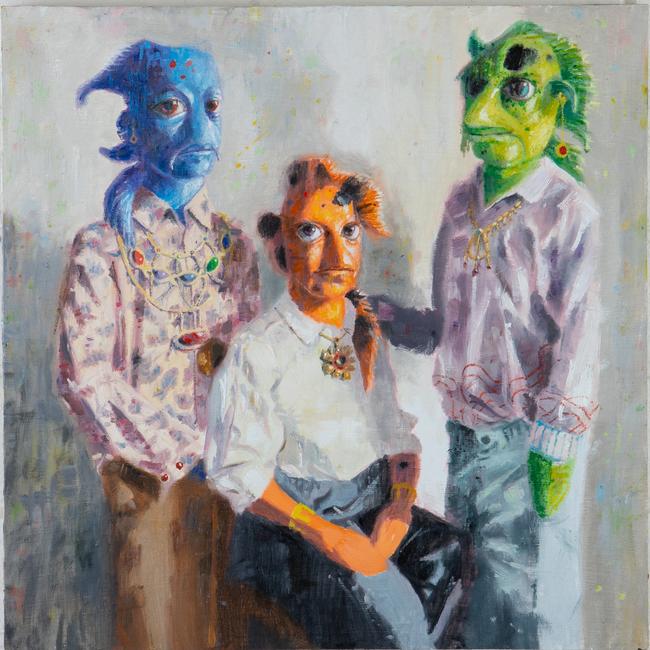
JAZZ
Koi Kingdom
Koi Kingdom
Earshift Music
This is the third album from Melbourne trio Koi Kingdom, which includes three extraordinarily brilliant musicians: saxophonist Cheryl Durongpisitkul, guitarist Marcos Villalta and bassist Stephen Hornby. I cannot speak too highly of the distinctive musical vision in operation here. Their seven compositions are thoughtful, highly original, and played with compelling passion. Their time-feels, always expertly well-constructed and workable, give the album a pleasing variety, suggesting multiple influences which supersede jazz. Strong unison lines in the compositions contrast with the sometimes turbulent but always virtuosic improvisations from all players. I have rarely heard a trio which maximises so effectively the possibilities inherent in the three instruments available to them. A whimsical aspect of the album is the underlying narrative, created by the musicians, about a mythical Koi Kingdom in an imaginary ancient culture which provides a playful background to the compositions, and gives the album structure. Rohan Sforcina (drums) and Keshav Yoganathan (percussion) are added on two tracks, and the album closes with a lovely vocal piece from the 10-person Koi Choir.
Eric Myers
Album reviews for week of July 26 2024:

POP
Ask That God
Empire of the Sun
EMI Music Australia
Eight years is a reasonably long gap between records these days, but when you factor in that Nick Littlemore is perhaps the busiest man in music with numerous projects and production work always in the works, it seems totally understandable. Indeed, Ask That God – Empire of the Sun’s fourth album – began life quite a while ago when Littlemore and the other half of the duo, Luke Steele, were in Japan in 2016. They were in the country to film a music video for a track from their record that year, the middling Two Vines, when they decided to book a studio for two weeks and throw around some ideas for the follow-up. They came up with some “crazy” sounds, Littlemore said of those initial sessions, and they even brought in a Japanese monk to record some chanting. Quite a bit has happened in the years since. Littlemore’s other project, dance trio Pnau, had a healthy renaissance via wildly popular singles such as Chameleon, Go Bang and its most recent chart-topping single, Cold Heart, a collaboration with Elton John and Dua Lipa. Pnau’s newest album Hyperbolic, released this year, featured collaborations with some of the world’s biggest artists including Khalid, Troye Sivan and Bebe Rexha. Never one to stop, Littlemore also has teased recently the return of Teenager, his cult art-punk project with Pip Brown (aka Ladyhawke). Steele hasn’t been idle either, teaming up with Silverchair’s Daniel Johns for the collaboration Dreams in 2018, as well as releasing his debut solo record in 2022.
Like Littlemore, he also has been diving back into the past, reportedly working on new music for his beloved 2000s indie-pop project The Sleepy Jackson. There has been so much going on that perhaps we forget just how big a juggernaut Empire of the Sun was. Breakout 2008 single Walking on a Dream was one of the biggest and most recognisable Australian songs of the decade, and the duo enjoyed more success with towering, stadium-sized pop singles such as Alive and DNA. Empire of the Sun’s theatrical, dizzying dance-pop has earned it many devotees. Fans of those glittering pop singles will have more than enough to tuck into on Ask That God. Singles Changes, AEIOU and standout Cherry Blossom — which sounds as if it could be a B-side from 2008 — remain firmly in EOTS territory. There are some fun experiments: The Feeling You Get brilliantly channels ABBA and Wham! (is that a keytar solo I hear?), while the title track filters Steele’s affected vocals through streams of falling synths. Other tracks don’t come off so well, such as the spoken word Rhapsodize and closer Friends, which squeezes the vocals so much they sound like frenetic video game characters in an otherwise quite tender song. But whatever the psychedelic missteps, the world of Empire of the Sun is certainly never dull.
Jules LeFevre
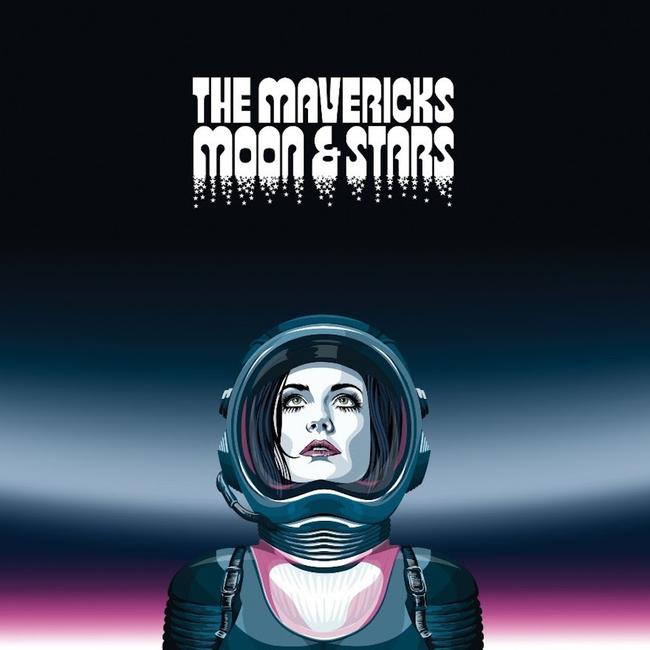
AMERICANA
Moon & Stars
The Mavericks
Mono Mundo
With their 13th album in 34 years, venerated US veterans The Mavericks serve up a characteristically classy mix of genre-bending Americana. In Moon & Stars, recorded in Nashville, Santa Fe and Louisiana, the Grammy acclaimed quartet takes a self-described journey of reflection and introspection, learning and evolving. Lead singer Raul Malo’s powerful Roy Orbison-inflected vocal cords lend several of his band’s co-composed ballads an authentic 1960s/70s feel – with added ambience courtesy of guitarist Eddie Perez’s strummed whammy bar chords on And We Dance. Malo’s duets with female guests are a highlight of the early numbers, in particular his alliance with the much-in-demand Sierra Ferrell in a Tex-Mex tinged title track, sandwiched between a brass-enhanced song with Nicole Atkins and a funkier guitar-enhanced track with Maggie Rose. Opening piece The Years Will Not Be Kind, driven by Latin rhythm and highlighted by an inspired Scarlet Rivera-like fiddle break, sets the tone for the album’s overarching feel of reminiscing and trepidation. Style-wise, the closing entreat, Turn Yourself Around, has surprising shades of 1970s band Wings.
Tony Hillier
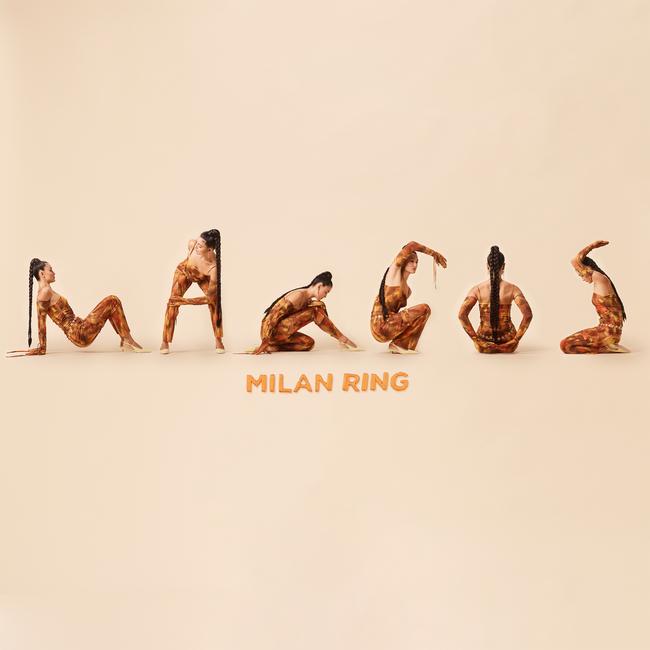
R&B / POP
Mangos
Milan Ring
Astral People
Intricate, textured and beautifully executed, Mangos – the second album by Sydney songwriter, musician and producer Milan Ring – is a 10-track set that grows on the listener with each playback, and ripens into an even more delicious experience with each turn. Beautifully arranged strings meet guitar melodies and progressions that are delivered with a natural talent. There are moments of R&B fused with pop and electronica; rhythmic funk leans into moments of buttery vocals and percussion. Mangos explores the feelings of love, euphoria and catharsis that come with the onset of new relationships; as well as the realities that often set in. It is a collection of music that serves as a set of observations (Quicksand, Photograph) on how humans interact with one another, while also serving as a reminder that we are flawed, yet powerful (Mangos, Shadows). It’s a masterclass in demonstrating Milan’s multifaceted artistry: as a solo writer, performer and producer, Mangos retains a thread of ambition and experimentation that runs effortlessly throughout.
Sosefina Fuamoli
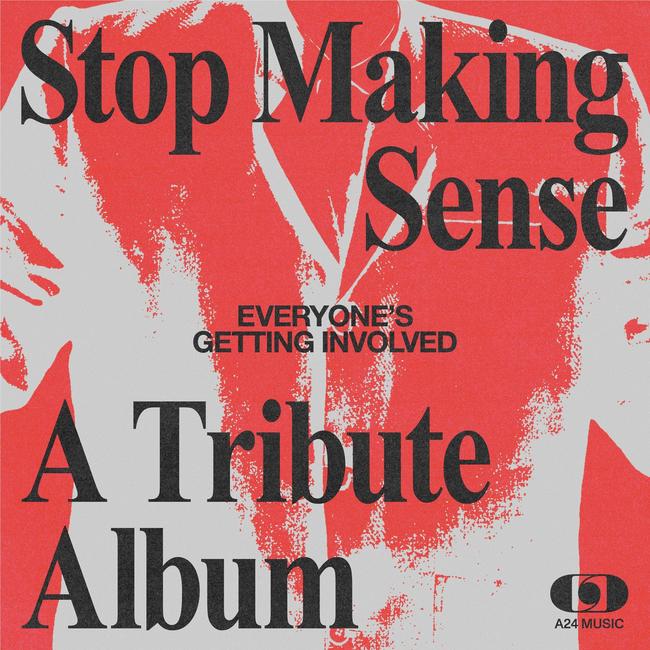
ALTERNATIVE
Everyone’s Getting Involved: A Tribute to Talking Heads’ Stop Making Sense
Various Artists
A24 Music
From its boombox intro through to the reveal of David Byrne’s comically large suit, Stop Making Sense has truly stood the test of time as one of the great concert films. To pay homage on its 40th anniversary, a fittingly-eclectic series of artists have recorded covers of each Talking Heads song played on that fateful night. Everyone’s Getting Involved, by nature alone, is a mixed bag. Some take liberties that pay off: the album’s surprise highlight may well be Argentine rock band El Mato a un Policia Motorizado’s driving take on Slippery People. Others, like Miley Cyrus’ neon-rave rework of Psycho Killer or Kevin Abstract’s clumsy Once In A Lifetime, seem to miss the point. Some of the best moments are the ones that get the Goldilocks balance just right: Paramore’s lively Burning Down The House, Girl in Red’s Girlfriend Is Better and BadBadNotGood’s Naive Melody (with Norah Jones) are all faithful, but also splice in the artists’ own stamp of identity. The influence of Talking Heads remains steadfast within contemporary music, and even with its flaws Everyone’s Getting Involved truly, unabashedly celebrates that.
David James Young
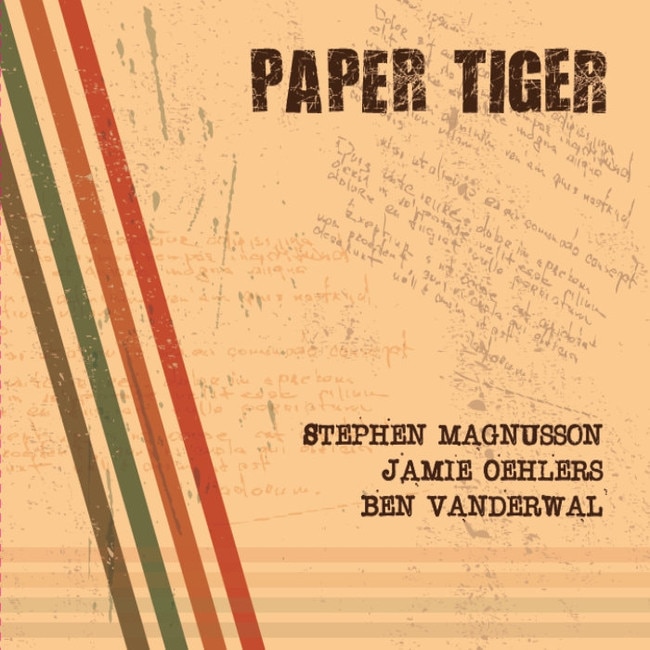
JAZZ
Between the Lines of Stillness
Paper Tiger
Independent
When Perth saxophonist Jamie Oehlers won the World Saxophone Competition at the Montreux Jazz Festival in Switzerland in 2003, this was clear evidence that the best of our musicians can compete successfully with the cream of international jazz artists. Still, this truism is not widely acknowledged by the arts establishment in this country. Now head of jazz studies at the West Australian Academy of Performing Arts (WAAPA), Oehlers has since recorded prolifically over the years with a host of Australian jazz artists. He’s accompanied here by two similarly brilliant musicians: Perth’s Ben Vanderwal (drums) and Melbourne’s Stephen Magnusson (guitar). Oddly, this is another Australian album where there’s no bassist present. While this absence is not debilitating, it means there are times when one feels that the music is struggling, particularly when Magnusson solos when accompanied only by drums. Still, with musicians of this calibre, they somehow make it happen, and have produced highly listenable music. All three musicians contribute impressive originals, but they are mostly written by Oehlers, whose singular artistry dominates the album.
Eric Myers
Album reviews for week of July 19 2024:
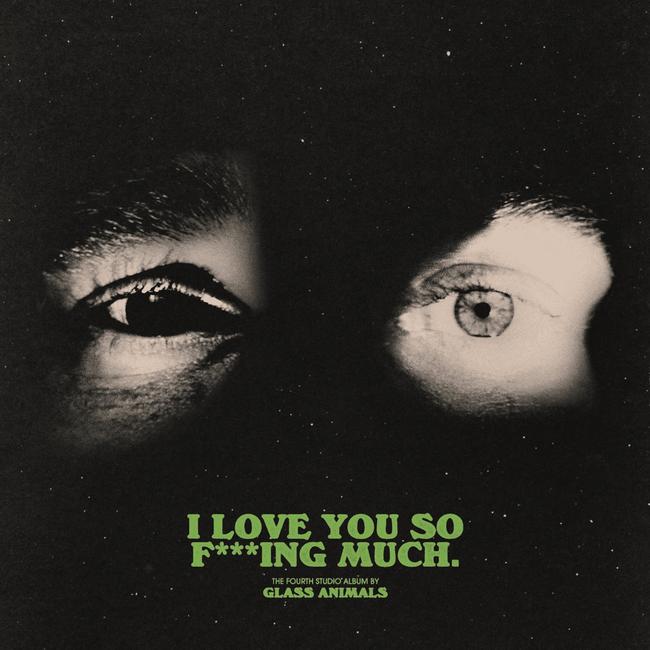
INDIE POP/ROCK
I Love You So F***ing Much
Glass Animals
Republic/Universal Music
On their fourth album, British indie pop group Glass Animals demonstrate that they are nowhere near done expanding their sound and pushing into new creative directions. I Love You So F***ing Much is the band’s first collection of new material since 2020’s Dreamland earned the band viral success and global fame thanks to one big hit: fourth single Heat Waves. The song landed Glass Animals two Brit Award nominations, a first Grammy nomination and the No.1 song on Triple J’s Hottest 100 poll of the same year. While that earworm chart-topper brought the British quartet global acclaim, Glass Animals had already built a strong following off the back of their first two records, Zaba (2014) and How To Be a Human Being (2016). Fusing indie rock with elements of electronic, psych-pop and hip-hop influences drew early support, while Dave Bayley’s songwriting and intimate lyricism positioned the group as more than a flash-in-the-pan contributor to the British sound of the 2010s. With I Love You So F***ing Much, that early essence of Glass Animals is still there, but there is a considered evolution in the band’s overall chemistry and musicality. Lead single Creatures in Heaven marries romanticism with the first hint of the existentialism that is felt throughout the rest of the record. “What do you think about when you think about love?” Bayley wonders, his voice drifting into ethereal territory – equal parts enticing and wistful.
At 10 tracks, this album gives Glass Animals the opportunity to explore themes of human connection and a broader sense of belonging, without feeling kitschy or shoe-horned. Album opener Show Pony sets a beautiful pace, while songs like Wonderful Nothing, On the Run and White Roses serve as great vignettes of this wider world Bayley’s lyrics detail. Admittedly, this album doesn’t have the stomper singles that marked the Dreamland era – if you came to this record seeking out a rehashing of Heat Waves, chances are you’ll wind up disappointed. What it does have, though, is some of Glass Animals’ most concise and emotionally intelligent work to date, namely second single, A Tear in Space (Airlock). For long-time fans, the album feels like a graduation in both sound and style. There is also a boldness in perhaps eschewing a formula you knew would work, in favour of venturing into territory that pushes you as an artist. The success of Dreamland brought this unique band rapid momentum and profile, and album No.4 feels like Glass Animals are wisely taking a moment to enjoy a long exhale of air after the chaos has died down. Here, they explore the mystery of the human condition once more, and in doing so, rediscover their own sonic vision and core chemistry – a reawakening that proves an immersive listening experience.
Sosefina Fuamoli

JAZZ
Electronic
Gemma Farrell Quintet
Independent
This is a happening and very hip album from an excellent Perth quintet led by saxophonist Gemma Farrell. Farrell plays the whole saxophone family in 10 of her compositions/arrangements, which are strong throughout. It is her extensive use of the unusual electronic wind instrument (EWI) however, which gives the album its characteristic sound. The EWI was invented in the 1980s, and was popularised by the late American saxophonist Michael Brecker, who played it in his fusion band, Steps Ahead. It has a biting, penetrating sound, particularly in its lower register where its sound is rather dirty, growly and surprisingly appealing. In its higher registers, the EWI sounds somewhat like a synthesiser. Farrell’s fellow quintet members, who play with typical Perth expertise, are Sam Hadlow (trombone), Dan Garner (guitars), Kate Pass (electric bass) and Ryan Daunt (drums). There’s a variety of time-feels throughout the album, some using the conventions of jazz/rock fusion, but there is also a leanness and flexibility in the music which denotes it as modern jazz. This is Farrell’s ninth album, and it is highly recommended.
Eric Myers
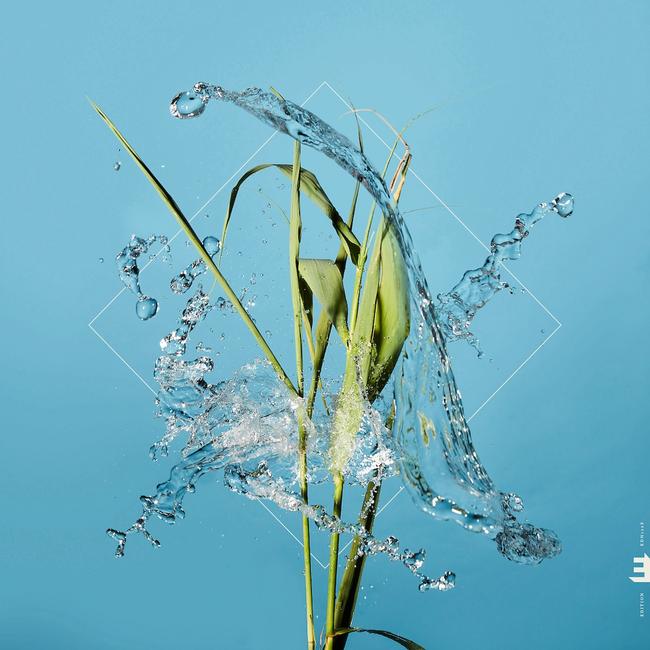
JAZZ/FOLK
Stream
Fergus McCreadie
Edition Records
Fergus McCreadie is a palpably prodigious and prolific young pianist, who, with seemingly telepathic assistance from fellow conservatoire graduates, bassist David Bowden and drummer Stephen Henderson, has helped plant Scotland firmly on the world jazz map. With four highly praised LPs and a handful of awards to his credit, McCreadie is one of the most exciting artists to have emerged in recent years. While embedded in the continuum of modern jazz, his music is grounded in the trad-folk of bagpipes and the stunning beauty of Scotland. The rich tonal colour of his virtuosic chops produce memorable images. His bold brushstrokes, in harmony with intricate rhythms generated by Bowden and Henderson, help paint a nuanced tapestry inspired by glistening lochs, luxuriant glens and snowy peaks and, in the stupendous 13-minute centrepiece Lochan Coire Ardair, towering cliffs. Leaving no stone unturned in its wake, Stream flows with the fluidity of its title, pushing the musical language and narrative en route from darkness to light.
Tony Hillier

ROCK
Can We Please Have Fun
Kings of Leon
Lovetap/Capitol
After nine studio outings in 20 years, the only constant about Nashville’s Kings of Leon – apart from an unchanged familial line-up – is yet another five-syllable album title. Can We Please Have Fun, more desperate intent than polite request, reveals a band at a crossroads. The indecision is personified by producer Kid Harpoon (aka British musician Tom Hull, a Grammy Award-winner for his work with pop stars Harry Styles and Miley Cyrus), who is clearly using Kings of Leon to cut his alt-rock teeth. He starts well enough – the first seven songs recall the edginess of early Kings – before success turned them into a reluctant stadium act – but the album’s back end is where both band and producer run out of ideas. Nothing to Do counterpoints screaming atonal punk verses with an incongruous power pop chorus; Ease Me On takes a blunt stab at country; while the closing Seen is another tuneless dirge by which point Kid Harpoon is no longer shooting straight. It’s left to earlier tracks like Ballerina Radio, Rainbow Ball and Actual Daydream to carry the album, although as usual, the lyrics make zero sense. Unless you count Nowhere to Run, which, despite its righteous groove, asks the telling question: “Are we still having fun?”
Phil Stafford
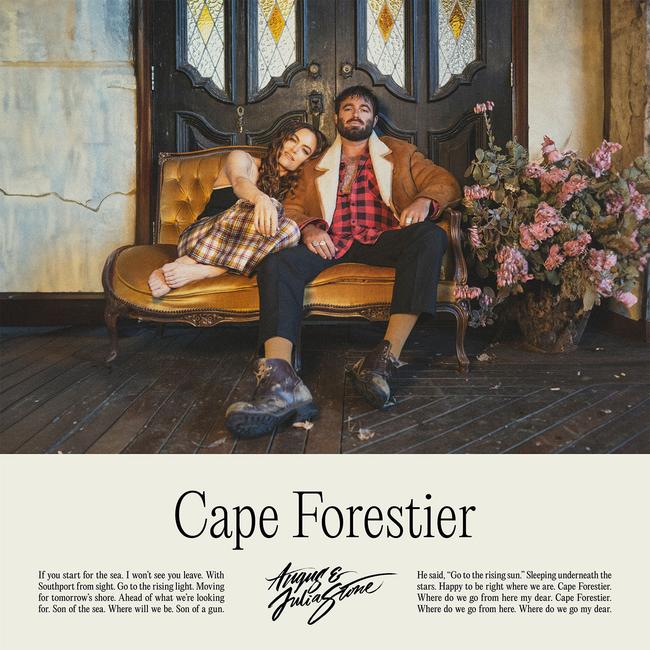
FOLK ROCK/INDIE POP
Cape Forestier
Angus and Julia Stone
Sony
The world may have gotten meaner and more dangerous since this brother-sister duo from Sydney’s Northern Beaches released their debut LP in 2007, but at least you can tuck yourself under a doona and listen to Grizzly Bear or Mango Tree and feel like you’re living a traditional life on a prairie. Since the duo’s much more adventurous fourth album, Snow (2017), things have felt particularly bleak, which will make the Stones’ return to more chilled, sonic areas a welcome one for longtime fans. Unlike earlier efforts though, these songs belong in Instagram reels documenting lazy beach holidays rather than farm stays. In particular, the opener, Losing You, and the title track have a breezier, airy quality, more akin to Jack Johnson than First Aid Kit. Elsewhere, Country Sign, City of Lights and I Want You go back to the indie-folk well of the 2010s, albeit without the sense of drama or darkness that hung over their earlier work. All in all, this is a collection of nice-sounding, well-crafted songs that will soundtrack gigabytes of content in the coming years. It’s perhaps this background quality, though, that makes it a little underwhelming by the duo’s standards, and even directionless at times.
Alasdair Belling


To join the conversation, please log in. Don't have an account? Register
Join the conversation, you are commenting as Logout